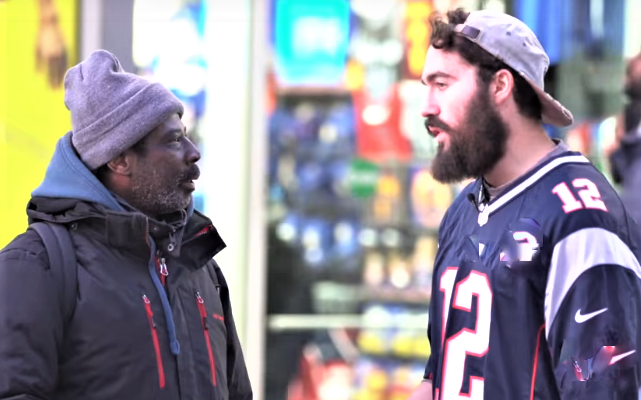“Seeing how one little Super Bowl party transformed people was truly life-changing,” said Meir Kalmanson.
By United with Israel Staff
For the third year in a row, social media sensation Meir “Kay” Kalmanson is hosting Super Bowl Sunday parties for the homeless. He offers a delicious meal, camaraderie and a chance to watch the big game in a warm, supportive environment.
“Super Bowl is this unofficial holiday in the US,” Kalmanson said in an interview with CNN. “There’s all this stuff going on for those who are experiencing homelessness around Christmas and Thanksgiving but nothing for the Super Bowl.”
Kalmanson’s videos, produced for the past ten years, are fun and joyful to watch. But, the man with the big smile and millions of followers on social media knows what it feels like to be alone. As a child, the rabbi relocated many times, facing loneliness and bullying for being Jewish.
Three years ago, when he saw a homeless man carrying a sign that asked for friendship rather than food, he got inspired to invite a group of homeless people to a Super Bowl party.
“He was holding a cardboard sign and on it said, ‘I don’t want anything to eat. I don’t want to drink. All I want is to be seen. I want to talk to somebody,”‘ Kalmanson told CNN. “That just hit me in the gut.”
Kalmanson brainstormed ways to address the problems of loneliness and hunger facing the homeless and decided a Super Bowl celebration would help. He bought football jerseys, lots of food, and invited a group of homeless men to join the festivities.
“Yes, we had different circumstances that took us to different places, but putting that all aside, we’re just humans,” Kalmanson explained to CNN. “Seeing how that one little party, those few hours, transformed them was truly life-changing.”
Party Time!
After he posted uplifting videos of the events online, Kalmanson was inundated with offers from volunteers and donors from all over the country who wanted to get involved.
“We plan the parties out so that there are an equal number of people who are experiencing homelessness and people who aren’t experiencing homelessness,” he said. “This way, people can connect on a one-to-one basis, and they can have a close, intimate conversations. We want everybody to feel that they’re being seen.”
This year, at least 20 Super Bowl parties for the homeless are taking place, under the auspices of Kalmanson’s nonprofit, Super Soul Party. The NGO also has clothing drives, distributes free hygiene kits, gives haircuts and manicures and provides therapy.
“Ultimately, the mission of the Super Bowl party is less about the party,” Kalmanson said. “It is just the stage for human beings to come together, to put aside our differences, our struggles or challenges, and connect on a human level to show love and compassion.”
